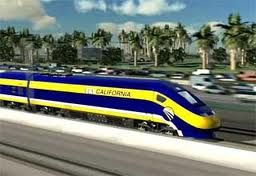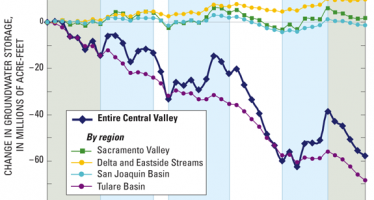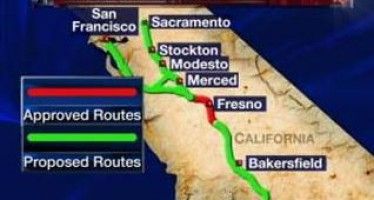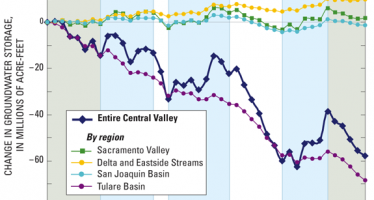Boondoggle Train Already Obsolete
The debate over whether to build an 800-mile network of bullet trains crisscrossing the state at speeds approaching 220 miles per hour is one of the most contentious we have today. Its projected cost of $45 billion (some analysts say double that) makes it the largest public works project in state history.
At a time when the project is facing unprecedented criticism, State Sen. Alan Lowenthal, D-Long Beach, has introduced SB 517, which he hopes will bring some measure of rationality to the project. The state of the project, Lowenthal’s chief of staff recently told me, has “disappointed” the senator, who is among the Legislature’s strongest high-speed rail supporters.
Since its creation, the High-Speed Rail Authority has operated pretty much on its own. Five of its nine members are governor-appointed, with the rest appointed by legislative leaders. As such, in recent years the authority’s board has run afoul of a scandal or two — accusations that two members were in violation of the state’s ban on holding “incompatible offices” as well as revelations that a few board members weren’t keeping accurate records of their travel expenses. (The state Fair Political Practices Commission recently ruled that they did not violate state law.)
“The senator has been consistently disappointed with the level of detail in the [authority’s] business plan,” said John Casey, Lowenthal’s chief of staff. “He’s found it not to be really serious.”
Lowenthal helped pass the original $10 billion bond measure a few years ago that really jump-started the high-speed rail effort. According to Casey, Lowenthal feels the rail authority in recent years simply hasn’t been effective. His bill would take the whole authority and place it under the direct control of the state Business, Transportation and Housing Agency.
“The bill would require the secretary to propose an annual budget for the authority upon consultation with the authority,” reads the bill text. “The bill would require the members of the authority appointed by the Governor to be appointed with the advice and consent of the Senate. The bill would provide for the members that are appointed to have specific background or experience, as specified.”
What’s more, the bill would place the Business, Transportation and Housing Secretary on the rail authority as an ex-officio member. And it would “enact various conflict-of-interest provisions applicable to members of the authority and its staff, as specified, and would prohibit a person from serving on the authority in certain circumstances,” according to the bill text.
Of course, it should come as no surprise that the rail authority isn’t too keen on Lowenthal’s effort — though apparently not because Lowenthal failed to capitalize “authority” in his legislation and thus give the panel sufficient respect.
“The Board has previously opposed proposals to place the Authority within Business, Transportation, and Housing, and remains consistent in that position,” Board chairman Curt Pringle wrote in an undated but often incoherent letter to Senator Mark DeSaulnier, D-Concord, chairman of the Housing and Transportation Committee. “It is our position that Senate approval of the majority the positions [sic] does not maintain the balanced nature of the Board.”
Pringle’s main argument though is that now is not the time to be fiddling with the accountability of the board, given its very sensitive need to find private financing for the cartoonishly expensive bullet train system they’re designing.
“An overhaul of the Board during these next two years of securing private investment and beginning construction would send the wrong signal to those critical partners,” Pringle wrote.
Oh, absolutely — if I were ponying up a few hundred million for bullet trains, I’d want to make sure the governing body was as controversial and secretive as possible.
In any case, there isn’t yet a published analysis of the bill, but it’s due for a hearing in the Senate Transportation and Housing Committee on April 26. Of course, all of this may be moot — and by “all of this,” I mean the whole decision to build a bullet train system in California.
The May issue of Popular Science has a glitzy image of a futuristic mag-lev train on the cover, announcing that new “supertrains” that are capable of 700 mile-per-hour speeds are coming soon — allowing travelers to move from New York to Los Angeles “in 41 minutes” without leaving the ground — and making the so-called “bullet trains” that are in California’s proposed system seem suddenly rather creaky and obsolete.
-Anthony Pignataro
Related Articles
Gov. Brown, Legislature push groundwater regulation
This is Part 1 of a two-part series. Due to the current compound drought and water storage shortage, California legislators
As consultant, bullet-train boss helped write doomed business plan
A lengthy Comstock’s profile of Jeff Morales, the former Washington D.C. and Chicago political operative brought in to save the
More dams or regulations to alleviate drought?
American diplomat Dwight Morrow wrote, “Any party which takes credit for the rain must not be surprised if its opponents





